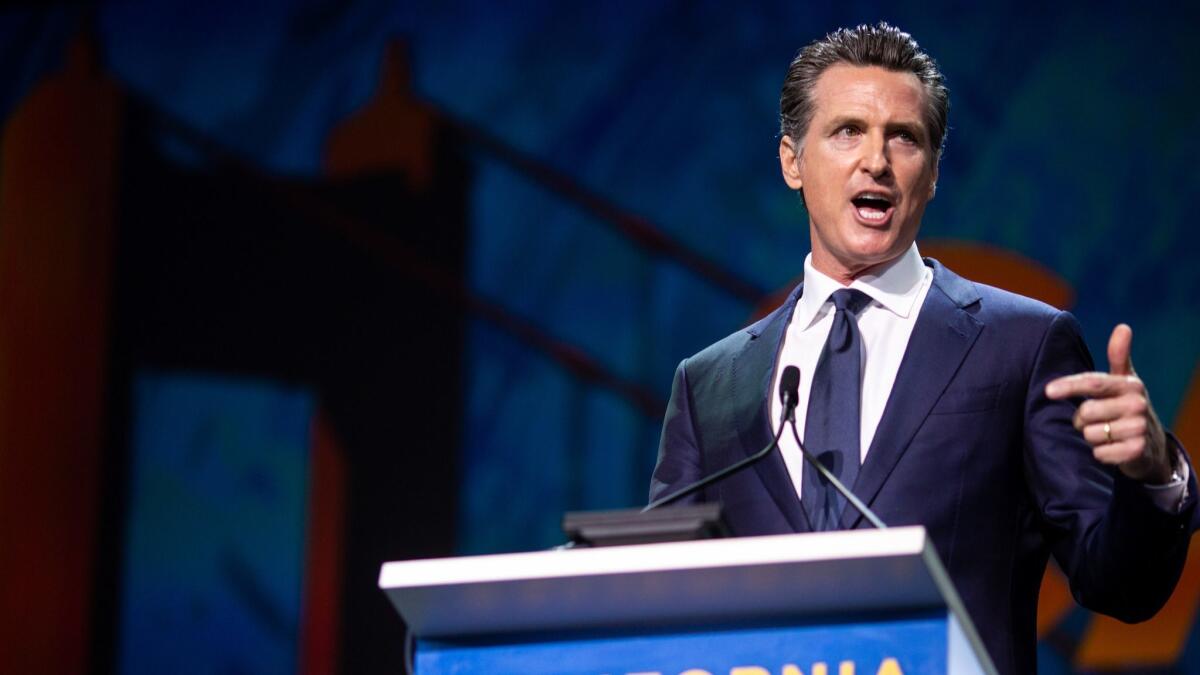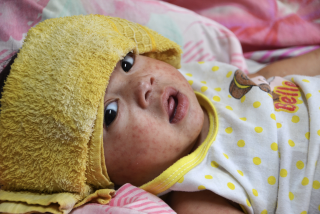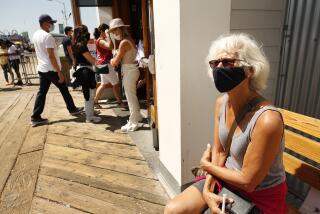Column: Gov. Newsom stepped into a vaccine debate we shouldn’t be having. Big mistake

Over the weekend, a reporter asked Gov. Newsom his opinion of a Senate bill to tighten the regulations concerning medical exemptions for child vaccinations.
His answer was a huge blunder.
Newsom’s response fed into the anti-vaccination fever swamp. He undermined a necessary effort to place oversight on the distribution of medical exemptions, which have soared sharply enough in the last two years to raise suspicions about whether some are not legitimate.
The governor’s comments could be taken as casting doubt on the professionalism of the state’s public health officials — in fact, on his own appointees. That’s bizarre, and inexcusable.
“I do have concerns about a bureaucrat making a decision that is very personal,” he said. The “bureaucrat” he’s referring to would be a state government official — his government official — performing the professional duty of overseeing compliance with state law.
I don’t want someone that the governor of California appointed to make a decision for my family.
— Gavin Newsom, governor of California.
To understand the absurdity of Newsom’s viewpoint, let’s look at the background.
First, the importance of childhood vaccinations is being demonstrated more than it has in years. U.S. cases of measles, which should long ago have been eradicated, have soared to 981 this year in California and 25 other states, according to the Centers for Disease Control and Prevention. That’s the highest level in a quarter-century, attributable to pockets of vaccine deniers threatening their entire communities with a serious illness.
The target of Newsom’s remarks is SB 276, which was introduced by state Sen. Richard Pan (D-Sacramento) in February and passed by the Senate late last month. The measure, which is now before the state Assembly, says that any medical exemption from vaccinations issued by a doctor must be approved by the state Department of Public Health — and must be accompanied by a certification that the doctor has personally examined the patient.
Pan introduced the bill because of a curious pattern in medical exemptions that arose after implementation of his last vaccine bill. That measure, which went into effect in 2016, abolished nonmedical exemptions in the state. It was a response to a surge in measles cases in 2014-15 associated with exposure to unvaccinated carriers at Disneyland.
Nonmedical exemptions had been handed out like sugar pills, in some communities apparently to anyone who claimed to have personal misgivings about child vaccination, whether based on stupidity, arrogance, or misrepresentation by the anti-vaccine lobby.
As Pan and vaccine expert Dorit Reiss reported last year, the statewide kindergarten vaccination rate had fallen to only 90.4%, well below the 94% that confers “herd immunity” to measles — that is, enough children were vaccinated to suppress the spread of any measles introduced into the population by an unvaccinated person. That’s necessary to protect those who can’t be vaccinated for legitimate reasons, such as infants or people with damaged immune systems.
The new law worked superbly, and almost instantaneously. After the law went into full effect in 2016, the kindergarten vaccination rate rose to more than 95%.
Healthcare professionals expected the rate of medical exemptions to rise after the law was passed, partially because families with legitimate medical excuses had been opting for personal exemptions to avoid excess paperwork, and now had to take more formal steps.
What surprised them was the rate of increase. They more than tripled. Some schools reported rates higher than 20%, “revealing that many students received inappropriate MEs,” Pan and Reiss reported.
There isn’t much that can be done about unscrupulous physicians handing out unwarranted medical exemptions, except subjecting the exemptions to outside scrutiny. That’s what Pan’s bill would do.
That brings us back to Newson’s comments. He didn’t exactly volunteer them, but was responding to a question from a Politico reporter during last weekend’s California Democratic Party convention.
“I like doctor-patient relationships,” he said. “Bureaucratic relationships are more challenging for me…. I don’t want someone that the governor of California appointed to make a decision for my family.” Um, isn’t he the governor of California?
He seemed aware that his remarks might be taken as an endorsement of the anti-vaccinated crowd. “I know that appears to parrot a mantra,” he said. “I’m not parroting a mantra.” He said he believes in immunizations and has had his four children vaccinated.
On Monday, queried anew by my colleague Taryn Luna, he repeated his confidence in vaccinations but added that he was wrestling with how to address the problem of unwarranted medical exemptions.
“To the extent we’re creating a new bureaucracy, that creates some red flags for folks…. I was expressing a point of view that was not ideological, that was very pragmatic and practical.”
Sorry. That won’t do. Despite his demurrers, Newsom’s comments were picked up by the anti-vaccination crowd. Robert F. Kennedy Jr., a prominent anti-vaccine activist, praised Newsom’s “wise and sober opposition to a draconian proposal to forcibly vaccinate medically fragile children against the wishes of their parents.”
Kennedy wrote on Facebook that Newsom “expressed his concern about giving faceless government officials (with no medical training) veto power over vaccine exemptions deemed medically necessary by a child’s doctor.”
There’s a lot of baloney, thinly sliced, packed into Kennedy’s rhetorical sandwich. The whole point of Pan’s bill is to ensure that only “medically fragile children” are exempt from vaccinations, and that medical exemptions don’t deteriorate into a back door allowing exemptions to be handed out again irresponsibly.
Newsom’s remarks, quite predictably, fueled this nonsense, his expressed doubts about “bureaucrats” becoming smoothly translated into “faceless government officials” by Kennedy.
If Newsom really has doubts about the professionalism of the California Department of Public Health, let him say so, and fire its management for malfeasance. What conceivable reason could he have for expressing doubts about their ability to do their job?
Newsom also blithely exaggerated the “bureaucratic” burden of enforcing the vaccination law. “There is a lot of open-ended anxiety,” he told Luna, “on how we actually deliver tens of thousands of people looking for bureaucratic exemptions, how the bureaucracy can address that issue.”
As of 2016-17, the number of California children with medical exemptions was 2,850. Does Newsom really think the Department of Public Health can’t vet that many applications? If so, let him recommend a suitable increase in its budget. The health crisis is real enough.
Sen. Pan, a pediatrician, has stepped gingerly into the minefield that Newsom sowed. In a prepared statement, he said, “I appreciate that Gov. Newsom recognizes that fake medical exemptions put schools and children at risk and the state needs to halt the abuse of exemptions.” He said he’s working with Newsom on how to solve the problem.
One residual problem of this blow-up is that it raises doubts about how Newsom really feels about child vaccinations. He needs to do more than state that he believes in vaccinating his own family, and come out with a foursquare endorsement of the state’s tightened enforcement regime and its plans for a further tightening, without shilly-shallying about “bureaucrats” and being “pragmatic and practical.”
The anti-vaccine movement has gotten out of control, thanks to a combination of loose talk by political leaders and deliberate misrepresentations, sometimes crossing over to fraud, questioning the established safety of vaccines. California was on the verge of getting its arms around this problem, but now its progress could be slowed or even halted. Public health is at risk.
Keep up to date with Michael Hiltzik. Follow @hiltzikm on Twitter, see his Facebook page, or email michael.hiltzik@latimes.com.
Return to Michael Hiltzik’s blog.







